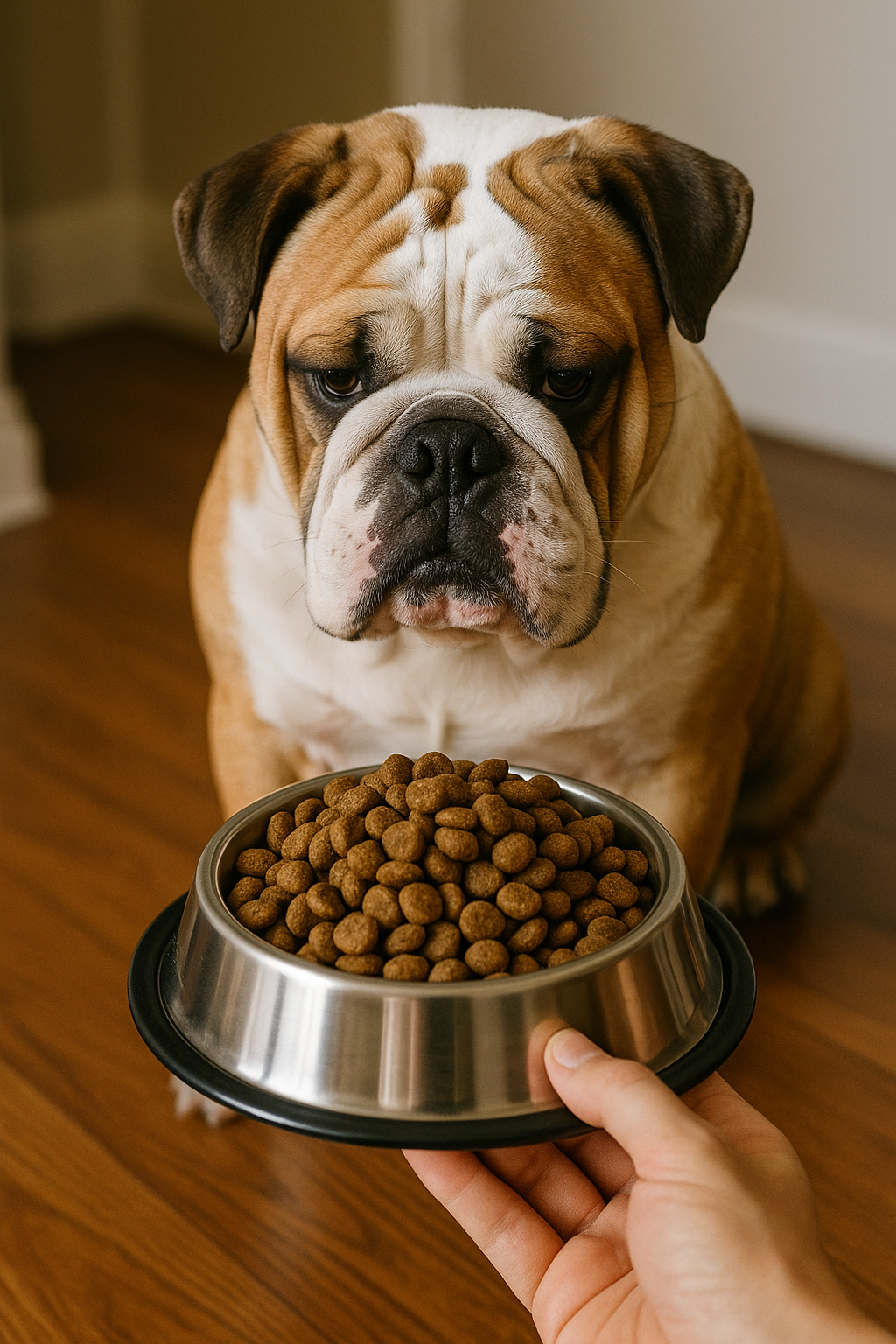Choosing the ideal food for a bulldog might seem simple, but it actually requires attention to details that make a big difference in your companion’s health and well-being. Due to their unique physical characteristics—such as a robust body, flat snout, tendency toward weight gain, and digestive sensitivity—bulldogs need a balanced, high-quality diet tailored to their specific needs.
In this article, you’ll learn the key criteria for selecting the best food for bulldogs, which ingredients to avoid, how to read food labels, and how to adjust their diet according to their life stage.
Understand the Nutritional Needs of Bulldogs
Bulldogs have a slower metabolism compared to other breeds, making them prone to weight gain. Their heavy bone structure and joints require proper nutritional support. Additionally, digestive sensitivity is common, with many bulldogs experiencing gas, soft stools, or intolerance to certain ingredients.
Therefore, the ideal food should contain high-quality proteins, moderate calorie content, fiber for healthy digestion, fatty acids for skin and joints, and avoid ingredients that can cause allergies. Balance is key—the food shouldn’t be low in nutrients or excessively high in calories.
Opt for Super Premium or Specialized Premium Foods
Dog foods are classified into different quality tiers. For bulldogs, super premium and some specialized premium lines are the most recommended. These foods use high-quality ingredients, offer high digestibility, balanced formulas, and avoid artificial colors and preservatives.
Lower-tier or standard dog foods should be avoided, as they typically contain low-grade by-products, have poor nutritional value, and often cause digestive issues like smelly stools and gas.
Read the Ingredient List Carefully
The ingredient list is one of the most important parts of the packaging. The first ingredients listed are those present in the highest quantities. Ideally, there should be an animal protein among the first three ingredients, such as chicken, meat, or dehydrated fish.
Avoid foods containing “meat and bone meal,” “poultry by-products,” or excessive amounts of corn, soy, and wheat as main ingredients. These components are usually of lower nutritional quality and may trigger allergies in sensitive dogs.
Look for formulas that include omega-3 and omega-6, glucosamine, chondroitin, prebiotics, natural antioxidants, and vitamins. These nutrients help maintain a shiny coat, healthy skin, strong joints, and a balanced immune system.
Choose Food Based on Life Stage
Just like humans, dogs have different nutritional needs at each life stage. For bulldog puppies (up to 12 months), it’s essential to choose food specifically formulated for puppies. These contain more calories, protein, and calcium to support bone growth and development.
Adult bulldog food should be more balanced and moderate in calories to prevent weight gain. For senior bulldogs (from age 7 onward), formulas with lower fat, more fiber, and kidney/joint-supporting supplements are ideal.
Never feed an adult bulldog puppy food or vice versa. The nutritional imbalance can lead to issues such as obesity, malnutrition, or stress on vital organs.
Be Careful with Portion Sizes
Even with the right food, serving portions that are too large can harm your bulldog’s health. Overfeeding leads to weight gain, which puts strain on joints and increases the risk of respiratory and heart issues common in this breed.
Check the package for the daily recommended amount based on your dog’s weight. This information serves as a guide but can be adjusted with your vet’s help based on activity level, metabolism, and overall health.
Ideally, divide the daily amount into two meals to avoid long fasting periods and aid digestion. Stick to regular feeding times, avoid giving table scraps, and monitor the number of treats and snacks.
Breed-Specific Bulldog Food
Some brands offer breed-specific formulas for bulldogs. These foods take into account the breed’s unique traits, such as the shape of the muzzle, their tendency toward gas, and the need for skin and joint care.
These formulas often feature kibble designed to be easier for bulldogs to pick up and chew, improving eating efficiency. They also include nutrients that help reduce stool odor and support healthier skin, especially between their folds.
If it fits your budget, these formulas are excellent options that offer more personalized and complete care.
When to Change Your Bulldog’s Food
You should only change your bulldog’s food when necessary—and always do it gradually. A sudden change can cause vomiting, diarrhea, or refusal to eat. The best way to transition is over seven days, mixing increasing amounts of the new food with the old one.
Common reasons to change food include a change in life stage, the appearance of allergies, digestive issues, veterinary advice, or the search for a more suitable formula.
Whenever in doubt, consult your veterinarian before making any dietary changes.
Conclusion: A Conscious Choice Is an Investment in Health
Choosing the right food is one of the most important decisions you can make for your bulldog. Poor nutrition can lead to problems like obesity, allergies, hair loss, digestive disorders, and weakened immunity. On the other hand, a high-quality, well-managed diet tailored to your dog’s life stage guarantees longer life, energy, and well-being.
As a responsible owner, your duty is to provide proper nutrition. Remember that what your dog eats daily has a direct impact on their health and quality of life. With clear information, careful attention to ingredients, and veterinary support, you’ll always be making the best choice for your loyal companion.
